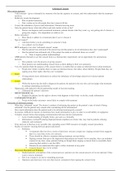Study guide
Informed Consent
16 pages worth of notes containing lecture notes, summary of academic literature and relevant case law and legislation. Considers arguments in favour and against informed consent. Considers the legal protections to informed consent in reference to patient autonomy. Covers Montgomery case and all ot...
[Show more]




